Levant Mine and Beam Engine
Levant Mine and Beam Engine is a National Trust property at Trewellard, Pendeen, near St Just, Cornwall, England, UK. Its main attraction is that it has the world's only Cornish beam engine still operated by steam on its original site. There is also a visitor centre, a short underground tour, and the South West Coast Path leads to Botallack Mine, via a cliff-top footpath.[1]
| Levant Mine and Beam Engine | |
|---|---|
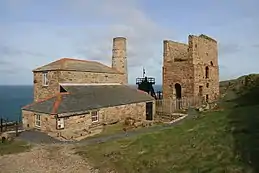 Boiler house (with chimney) and whim building on the left, pump engine house to the right | |
| Type | industrial heritage, mine |
| Location | Trewellard, Cornwall |
| Coordinates | 50°09′08″N 5°41′08″W |
| Owner | National Trust |
| Type | Cultural |
| Criteria | ii, iii, iv |
| Designated | 2006 (30th session) |
| Part of | Cornwall and West Devon Mining Landscape |
| Reference no. | 1215 |
| Region | Europe and North America |
Listed Building – Grade II | |
| Designated | 1979 |
| Reference no. | 1143268 |
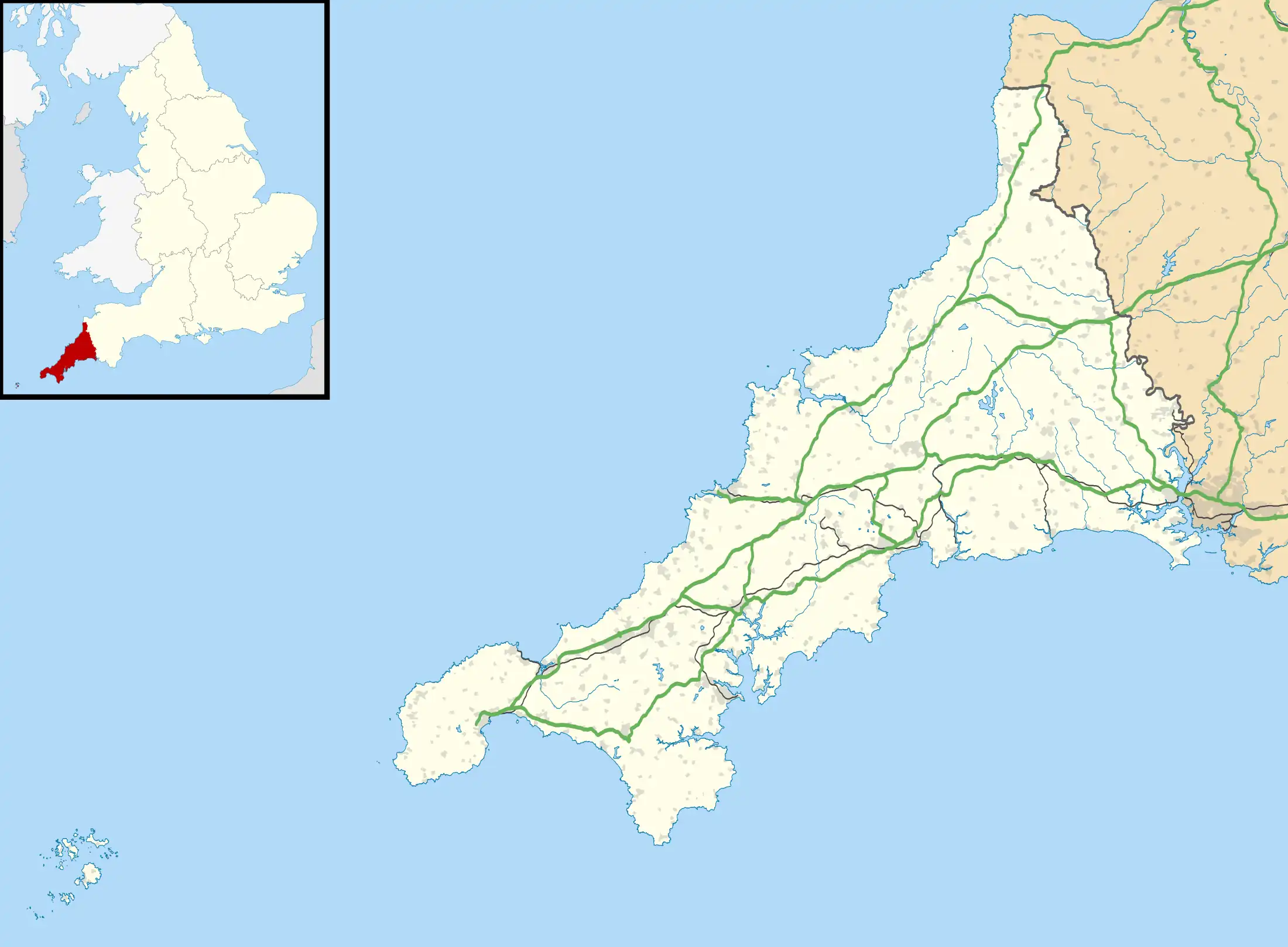 Location of Levant Mine and Beam Engine in Cornwall | |
In 1919 the engine used to transport men between the different levels of the mine failed, leading to the deaths of thirty-one men. Since 2006, the area has been part of the UNESCO World Heritage Site, Cornwall and West Devon Mining Landscape.
Site

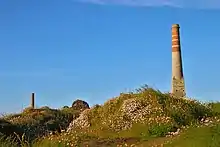
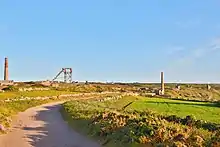

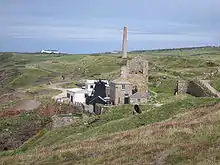
The property is on the site of the former Levant Mine, established in 1820 and closed in 1930, where tin and copper ores were raised. The mine reached a depth of about 600 metres. It got the nickname "mine under the sea", because tunnels were driven up to 2.5 km from the cliffs under the sea. The surviving beam engine was built c. 1840 by Harvey's of Hayle.[2]

History
The mine yields both copper and tin and was opened in 1820 with twenty shares of £20 each. From first opening, to circa 1883, the mine gave a profit of £171,000 from approximately £1,300,000 worth of ore. In 1882 the mine was taken over by new owners on a 21 year lease, replaced machinery and improved the surface-works.[3]
In 1883 three shafts were open. One shaft is occupied by the man-engine, a second by a pumping-engine and the third for hauling out the skips. Since the introductions of skips, for bringing ore to the surface, two shafts were abandoned. There was six engines on site,
- pumping-engine, 45 inches (1,100 mm) cylinder – pumps water from the mine
- stamping, 30 inches (760 mm) cylinder – breaks up the ore
- winding-engine or whim, 26 inches (660 mm) cylinder – raises the ore to the surface
- man-engine, 24 inches (610 mm) cylinder
- crushing-machine, 18 inches (460 mm) cylinder
- winding-engine, 14 inches (360 mm) cylinder.[4]
A description of the working conditions of the mine was described in The Cornishman newspaper in 1883. Around 366 men, boys, and girls were employed compared with about 600 prior to 1882. The mine was worked in three, eight-hour shifts, (except on Sunday) with fifty to sixty men working underground in each shift. Access to the underground levels (i.e. passages) was by ladder and the temperature was around 92 °F (33 °C). The men were all more or less working in a nude state and sweating profusely. They were provided with spring water which was stored in huge canteens. Few are able to work underground after the age of 35.[3][5] The width of the levels are 7 feet (2.1 m) high and 3–4 feet (0.91–1.22 m) wide, while the width of the lode is from 6 inches (150 mm) to 3 feet (0.91 m) wide. Thus a quantity of hard rock on each side of the lode has to be cut away at great expense. The levels are expanded by explosives. First a hole is made by hand-drill 20 inches (510 mm) deep, taking about two hours and the hole is charged with gunpowder. Premature ignition causes many injuries and fatalities. A 14 inches (360 mm) cylinder engine raised the ore to the surface in skips on two parallel inclines, one ascending as the other was lowered.[5]
On 20 October 1919 an accident occurred when a metal bracket at the top of a rod broke on the man engine. The miners step on to a ladder, are transported 12 feet (3.7 m) up or down, climb off on to a sollar, step back on to the ladder, repeating the process. The rod broke in several pieces and heavy timbers crashed down the shaft, some of which were carrying more than a hundred miners to the surface; killing thirty-one. The engine was not replaced and the lower levels of the mine were abandoned.[6]
Minerals and ores
See also
- Man engine for an account of the accident in the mine on 20 October 1919.
- Geevor Tin Mine, just to the northeast of the Levant complex.
References
- "Levant Mine and Beam Engine". National Trust. Retrieved 15 October 2011. (dead link 2 September 2019)
- "Levant Mine and Beam Engine". Cornwall Museums. Retrieved 24 May 2016.
- Croft, E W (Ouit) (13 December 1883). "The Industries Of Penzance And Its Neighbourhood. No XX. The Mining Of St Just. 3 – Levant Mine". The Cornishman. No. 283. p. 7.
- Croft, E W (Ouit) (20 December 1883). "The Industries of Penzance and its Neighbourhood. No XX. The Mining Of St Just. 3 – Levant Mine (continued)". The Cornishman. No. 284. p. 4.
- Perambulating Contributor (29 October 1881). "Roundabout Papers No 9. A Visit To Levant Mine". The Cornishman. No. 281. p. 7.
{{cite news}}:|last1=has generic name (help) - Wisdom, Phil (17 October 2019). "Levant centenary will be marked on Sunday". The Cornishman. p. 3.